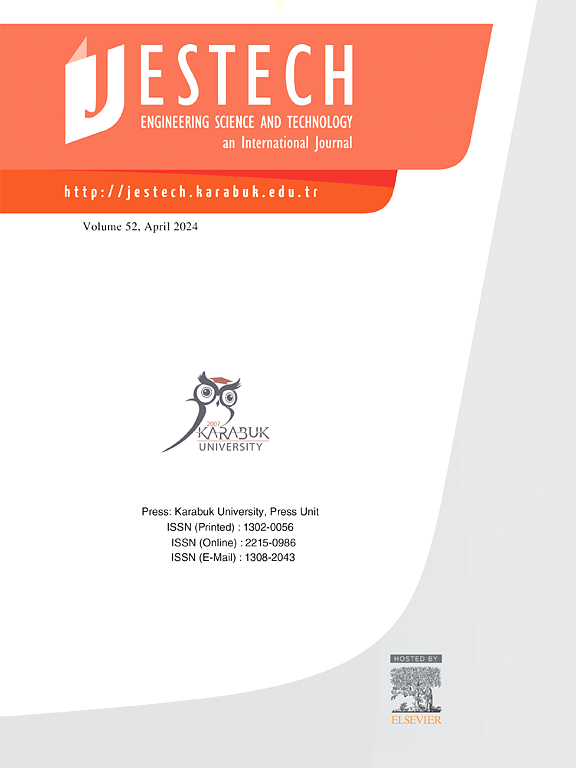双三相配置和基于交错载波的PWM技术对直流链路电流应力的影响
IF 5.4
2区 工程技术
Q1 ENGINEERING, MULTIDISCIPLINARY
Engineering Science and Technology-An International Journal-Jestech
Pub Date : 2025-05-03
DOI:10.1016/j.jestch.2025.102068
引用次数: 0
摘要
双三相(DTP)绕组配置在汽车动力系统中越来越重要,其中DC-Link电容器在功率密度和可靠性方面起着至关重要的作用,因为它约占逆变器体积的40%,约占其故障的30%。本文系统地分析了各种DTP配置(S0-DTP、A30-DTP、S60-DTP)和DTP专用的双零序注入(DZSI) PWM技术对DC-Link电容电流谱的影响,以最小化其RMS值。使用双傅立叶积分形式,这项工作推导了输入电流谐波的解析表达式,确定了主要纹波分量,并评估了抑制这些谐波的交错策略,从而降低了电容器上的RMS电流应力。实验结果证实,与标准的非交错调制相比,适当选择DZSI-PWM技术和交错角度可使电容器RMS电流应力降低85%,从而提高功率转换器的可靠性,而无需额外的硬件修改。这些见解为电动汽车动力系统和高性能多相逆变器提供了实用的设计指南。本文章由计算机程序翻译,如有差异,请以英文原文为准。
Effect of Dual Three-Phase configurations and interleaved carrier-based PWM techniques on the DC-Link current stress
Dual Three-Phase (DTP) winding configurations are gaining importance in automotive powertrains, where the DC-Link capacitor plays a critical role in terms of power density and reliability, as it accounts for approximately 40% of the inverter’s volume and about 30% of its failures. This work systematically analyses the influence of various DTP configurations (S0-DTP, A30-DTP, S60-DTP) and DTP-specific Double Zero-Sequence Injection (DZSI) PWM techniques on the DC-Link capacitor current spectrum to minimize its RMS value. Using the Double Fourier Integral formalism, this work derives analytical expressions for input current harmonics, identifies dominant ripple components, and assesses interleaving strategies to suppress these harmonics, thereby reducing RMS current stress on the capacitor. The findings are validated through experimental measurements, which confirm that proper selection of DZSI-PWM techniques and interleaving angles leads to up to 85% reduction in capacitor RMS current stress compared to standard non-interleaved modulation, thus enhancing power converter reliability without additional hardware modifications. These insights offer practical design guidelines for electric vehicle powertrains and high-performance multiphase inverters.
求助全文
通过发布文献求助,成功后即可免费获取论文全文。
去求助
来源期刊

Engineering Science and Technology-An International Journal-Jestech
Materials Science-Electronic, Optical and Magnetic Materials
CiteScore
11.20
自引率
3.50%
发文量
153
审稿时长
22 days
期刊介绍:
Engineering Science and Technology, an International Journal (JESTECH) (formerly Technology), a peer-reviewed quarterly engineering journal, publishes both theoretical and experimental high quality papers of permanent interest, not previously published in journals, in the field of engineering and applied science which aims to promote the theory and practice of technology and engineering. In addition to peer-reviewed original research papers, the Editorial Board welcomes original research reports, state-of-the-art reviews and communications in the broadly defined field of engineering science and technology.
The scope of JESTECH includes a wide spectrum of subjects including:
-Electrical/Electronics and Computer Engineering (Biomedical Engineering and Instrumentation; Coding, Cryptography, and Information Protection; Communications, Networks, Mobile Computing and Distributed Systems; Compilers and Operating Systems; Computer Architecture, Parallel Processing, and Dependability; Computer Vision and Robotics; Control Theory; Electromagnetic Waves, Microwave Techniques and Antennas; Embedded Systems; Integrated Circuits, VLSI Design, Testing, and CAD; Microelectromechanical Systems; Microelectronics, and Electronic Devices and Circuits; Power, Energy and Energy Conversion Systems; Signal, Image, and Speech Processing)
-Mechanical and Civil Engineering (Automotive Technologies; Biomechanics; Construction Materials; Design and Manufacturing; Dynamics and Control; Energy Generation, Utilization, Conversion, and Storage; Fluid Mechanics and Hydraulics; Heat and Mass Transfer; Micro-Nano Sciences; Renewable and Sustainable Energy Technologies; Robotics and Mechatronics; Solid Mechanics and Structure; Thermal Sciences)
-Metallurgical and Materials Engineering (Advanced Materials Science; Biomaterials; Ceramic and Inorgnanic Materials; Electronic-Magnetic Materials; Energy and Environment; Materials Characterizastion; Metallurgy; Polymers and Nanocomposites)
 求助内容:
求助内容: 应助结果提醒方式:
应助结果提醒方式:


